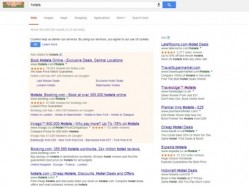Hotel websites see drop in number of direct bookings

According to figures from Zolfo Cooper's latest Leisure Wallet research, the number of guests who said they regularly book rooms via a hotel's own website fell from 56 per cent in 2012 to 52 per cent this year.
However, the OTAs failed to pick up the slack, with the number of people using this method to book remaining at 37 per cent across both years and despite the telephone still being used to book some rooms, the channel has been used marginally less this year to secure bookings than last (a drop from 21 per cent to 20 per cent).
One method which has seen growth for hotel bookings is the use of smartphones with bookings up 3 per cent to 10 per cent this year compared to last, although whether bookings were secured through mobile-friendly own brand websites or mobile-friendly OTAs is not known.
Graeme Smith, partner and head of hotels at Zolfo Cooper, said: “It is striking that, despite both greater focus and investment by hotel operators and brands to drive direct bookings online, fewer hotel guests are using this channel. While this decline does not translate directly into growth for the OTAs it is clear that online intermediaries are a significant part of the industry landscape, and perhaps the overall focus needs to evolve to strategies that deliver the most from each channel rather than one over the other.
“What is also very clear from the research is the enduring popularity of the telephone, and also the growth in smartphone bookings, which should continue to grow as location-based search apps become more sophisticated.”
Price influence
The survey of 2,000 people on their leisure habits, which also asked for details about habits around visits to restaurants, pubs and nightclubs also found that price was the most influential factor for 60 per cent of people when selecting a hotel in the UK with location a close second. Recommendation, whether it was via a review on a booking website (12 per cent) or word-of-mouth (11 per cent) was less influential while media reviews were only recognised by 9 per cent of people as influential in choosing a hotel.
However, price was less important to those booking rooms for business as just 10 per cent of respondents said it was influential when making a selection. This was reflective in the average room spend with business being higher at £76.51 per room per night compared to £55.83 per room per night for those booking a stay for leisure.
When it came to paying for bookings, there were concerns over new contactless payment systems with 58 per cent of people saying they were wary of its use because of lack of confidence over security while just 32 per cent said they would use it if they had the opportunity over the next 12 months.




















